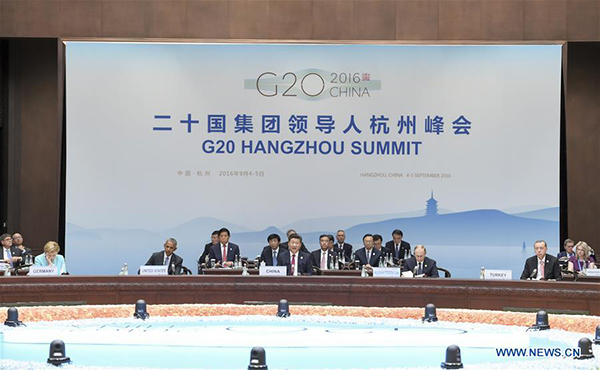Summit is crucial for role of G20
(China Daily) Updated: 2016-09-05 07:51
 |
|
Chinese President Xi Jinping presides over the opening ceremony of the Group of 20 (G20) summit in Hangzhou, capital of east China's Zhejiang Province, Sept. 4, 2016. [Photo/Xinhua] |
Editor's note: Chinese leadership during G20 presidency can help rescue group from irrelevance, international governance expert says. Barry Carin is a senior fellow of the Center for International Governance Innovation, based in Waterloo, Canada. He held several senior Canadian government positions and also taught at universities. He has been a participant and close observer of the G7, G8 and G20, including working on China's G20 presidency and the preparation process for this summit. He spoke with China Daily on Aug 11.
What is the special significance of the G20 in Hangzhou under the current global economic situation?

Barry Carin
Hangzhou is perhaps the best hope for rescuing the G20 as a respected and effective global steering committee. The G20 risks evolving into irrelevance. Its record for the last five years has been discouraging. Leadership will not come from an inward-looking and politically stalemated United States or from a European Union consumed by Brexit, the euro crisis and the flood of migrants and refugees. But there is no alternative to the G20 for effective global crisis management or a steering committee. The only hope is that China, exploiting its ingenuity, can provide the necessary leadership.
What's your view of the global economy after this G20?
It appears that what I learned as a PhD economist and taught as a professor of economics is all wrong. I believed that if central banks flooded the world economy with liquidity-quantitative easing-that inflation and hyperinflation would result. But inflation seems to be limited to certain asset classes. So I am pessimistic. More bubbles should burst, with unfortunate consequences. But I have no confidence in my assessment. I need more study to be able to predict the macroeconomic impact of the mass of people who are "predictably irrational".
What do you expect China to do and contribute in the years ahead?
Lao Tzu is cited as saying that "Governing a large country is like frying a small fish. You spoil it with too much poking". I expect China to continue to avoid the risks of aggressive, energetic leadership. The G20 is too large and heterogeneous to achieve consensus on highly complex and controversial issues in the short, one-year G20 presidency. Longer term, the best hope would be for China to first arrange a bilateral agreement with the US; then subsequently offer the EU and perhaps India to join the agreement. Then the agreement can be brought to the G20.
What do you suggest for the G20 in Hangzhou?
One of the constructive contributions China can make is to shape the future international policy research agenda by calling for reports for next year's G20 summit in Germany from G20 officials, G20 ministers or from international organizations. There are many precedents for these remits, commissioning work with specific terms of reference. As G20 president, China has the prerogative to make this type of request. Two ideas that would be in the common interest are to request reports to the German G20 on options for global responses on cyber security (particularly in reference to international finance) and on rules to delineate acceptable research on climate engineering.
- Official responds to doubts on G20 Summit media service
- Xi takes world's center stage at G20 summit
- Evening gala for G20 summit held in Hangzhou
- G20 Hangzhou summit opens, starting new journey for world's future growth
- The foreign press reacts to President Xi's G20 Summit speech
- G20 tableware inspired by West Lake landscape
- Professor Hugo Dobson's opinions on G20
- Xi expects G20 Summit to offer remedies to world economy












